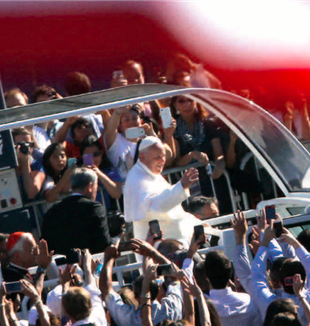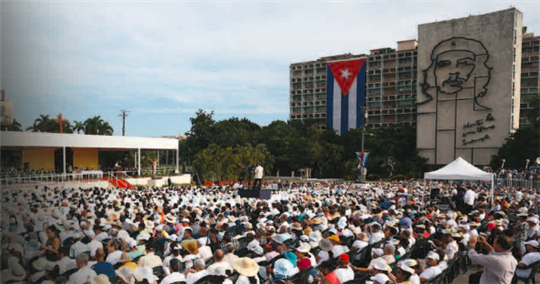
Caught off Guard
Commentary on the Pope’s visit in Cuba and the United States. From the intervention at the UN to the little school in Harlem. Days of weighty gestures and humble admonitions: the disarming power of the Gospel outlasted every challenge and category...“When the plane leaves after a visit, I see the faces of so many people. I get the urge to pray for them and say to the Lord, ‘I came here to do something, to do good; perhaps I have done some wrong, forgive me, and watch over all those people who saw me, who thought of what I said, who heard me, even those who criticized me, all of them.’” In that most personal answer given by Francis during the press conference with journalists on the plane from Philadelphia to Rome, followed by the affirmation, “you can’t say that in the newspapers,” we can find the key to understand the long trip that brought him to Cuba and to the U.S. It was the “disarming” trip of a Pope who came first and foremost to encounter, to get to know, embrace and to share; of one who, thanks to his gift for witnessing through both gestures and words, was able to find place in the hearts of a many; and leaving speechless those who either tried to put him into the box of their prejudices, or thought they had already “figured out” his visit and the presumed “difficulties” the LatinAmerican Pontiff would face in the
U.S. DOOR TO THE U.S.
Francis initially wanted to make his entrance into the United States traveling across the border with Mexico, the same that so many immigrants attempt to cross. It was deemed impossible because he could not travel to Mexico without stopping at the Shrine of Our Lady of Guadalupe in the capital city. Instead, thanks to the thaw in relations brought about with help fromVatican diplomacy, the Caribbean island governed by the Castros became the door to the U.S. In Cuba, Francis followed in the footsteps of John PaulII andBenedict XVI, to support the patient progress to which the Church in Cuba has dedicated itself for years. As soon as he set foot in Havana, in the presence of Raúl Castro, Francis referred to the softening of relations with the U.S. as an “event that fills us with hope,” “a sign of the victory of the culture of encounter and dialogue,” and “an example of reconciliation for the entire world.” He asked that “the Church... continue to support and encourage the Cuban people in their hopes and concerns, with the freedom and all the means needed to bring the proclamation of the Kingdom to the existential peripheries of society.”The rest of his Cuban sojourn had a pastoral tone. Celebrating Mass in the Plaza de la Revolución under the looming shadow of the likeness of Che Guevara, the Pope underlined that “service is never ideological, for we do not serve ideas, we serve people,” at the same time invitingCubans not to let themselves be taken in by “plans which can be seductive, but are unconcerned about the face of the person beside you.” To be great, we have to become small and “care for the frailty of others.” It’s a simple and concrete proposal: to “always look to the faces of our brothers and sisters” who suffer, to touch “their flesh,” sense “their closeness and even, in some cases, ‘suffer’ that closeness” in trying to help them.Because “whoever does not live to serve, does not ‘serve’ to live.” After Wojtyla’s visit, Fidel Castro had reestablished Christmas as a national holiday, and after Benedict’s, Raúl did the same with Good Friday. This time, the Cuban Church hopes that Francis’s visit will lead to allowing them greater access to, and more, channels of communication.
EXCHANGE OF GLANCES.
Without question, one of the most moving moments of the stop in Cuba was the Mass in Holguín on September 21st , the Feast of St. Matthew, the day on which 72 years prior, Jorge Mario Bergoglio’s life was changed when he felt the gaze of Jesus upon him just as when He called the tax collector. The sun blazed and the humidity was unbearable. Raúl Castro was in the front row with a wide-brimmed straw hat. Half the city was waiting for hours to see Francis. In his homily, the Holy Father reflected on the “exchange of glances” that transformed the life of Matthew, a sinner, a tax collector hated by the people, who only “the power in [Jesus’] eyes” could make “get up from his table and follow Him.” God always precedes us, as Francis underlines. “Even if we dare not raise our eyes to the Lord, he always looks at us first.” He goes beyond “appearances, beyond sin, beyond failures and unworthiness,” or social conventions. Because He came not to seek out the righteous and the perfect, but sinners; all those who feel “unworthy.” In the United States, where political and ecclesial life suffer from oversimplified polarizations–Democrat or Republican, liberal or conservative–Francis treaded carefully, with the unarmed and disarming power of the Gospel. His first public words were spoken on the South Lawn of the White House, with BarackObama at his side.“As the son of an immigrant family, I am happy to be a guest in this country, which was largely built by such families.” The admonition about the urgency of changing pace in dealing with the immigrants pushing across the Mexican border was not made ex cathedra. Instead, the Pope spoke of himself and ofAmerica, of the truth in her values and founding fathers. He did the same thing the next day in the much-anticipated address to Congress, the first address by a Pope on Capitol Hill. Bets were made about who would applaud for what during the papal address. Once again, Francis caught them off guard. He didn’t bring in a balance sheet to carefully weigh out pro-life or pro family statements and admonitions, or defending the poor and immigrants. His style is one of humble admonition and a personal witness that strikes to the heart of the person in front of him. “We, the people of this continent, are not fearful of foreigners, because most of us were once foreigners. I say this to you as the son of immigrants, knowing that so many of you are also descended from immigrants;” and “when the stranger in our midst appeals to us, we must not repeat the sins and the errors of the past,” such as those committed years ago against the Native Americans. Francis also asked for an end to the death penalty. His speech was framed around four great Americans: Abraham Lincoln, Martin Luther King, Dorothy Day, and Thomas Merton, each who defended liberty, the rights of all persons, social justice, help for the oppressed, and dialogue. It’s as if Bergoglio were saying: America, remember who you are! The most novel aspect of the significant speech to the Congress was the invitation to not fall into the temptation of over simplification, a common operating mode for much of contemporary politics and information. It’s this that divides the world all too easily into good and evil, the righteous and sinners; and is very convenient when you want to justify wars and armed conflict because they help to demonize your opponents. Francis certainly didn’t try to hide the threats of religious fundamentalism. The “brutal atrocities,” he explained, inflicted upon the contemporary world, leaves “open wounds which affect so many of our brothers and sisters, demands that we confront every form of polarization which would divide it into these two camps. We know that in the attempt to be freed of the enemy without, we can be tempted to feed the enemy within. To imitate the hatred and violence of tyrants and murderers is the best way to take their place. That is something which you, as a people, reject.” His intervention at the UN was in the same vein. Francis invited the world to defend the rights of those who are excluded from their environment “with force.” He asked for the dismantling of arms that make us “nations united by fear,” that conflicts be prevented using negotiation, and he called for reform of the UN and an increased presence of the Security Council. 
A BROTHER AMONG BROTHERS.
There were crowds that welcomed the Holy Father wherever he went, from visiting the school in Harlem to the prison in Philadelphia, but the highlight of his time in the U.S. were two addresses given to bishops. With the North American bishops,Pope Francis spoke as a “brother among brothers.” He asked them not to use “harsh and divisive language,” nor to restrict themselves to making “proclamations.” We need to “find room in people’s hearts”without ever making the cross into a “banner of worldly struggles.” With the bishops gathered from all over the world for the World Meeting of Families, he asked that they go beyond complaints and condemnations of what’s wrong around them: “As pastors, we bishops are called to collect our energies and to rebuild enthusiasm for making families correspond ever more fully to the blessing of God which they are! We need to invest our energies not so much in rehearsing the problems of the world around us, and the merits of Christianity, but in extending a sincere invitation to young people to be brave and to opt for marriage and the family.”He invited them to “waste time” with families, staying with them and sharing their difficulties, knowing how to stay close to those who are “lost, abandoned, wounded, broken, downtrodden and deprived of their dignity.”
DOWN FROM THE TREE.
If “we prove capable of the demanding task of reflecting God’s love,” the Holy Father concluded, citing Gospel scenes that are applicable to today’s questions, “cultivating infinite patience and serenity as we strive to sow its seeds in the frequently crooked furrows in which we are called to plant–for very often we really do have to sow in crooked furrows–then even a Samaritan woman with five ‘non-husbands’ will discover that she is capable of giving witness. And for every rich young man who with sadness feels that he has to calmly keep considering the matter, an older publican will come down from the tree and give fourfold to the poor, to whom, before that moment, he had never even given a thought.” Pope Francis offered us a living example of this outlook and approach, of pastoral conversion, during every stop of his American voyage.